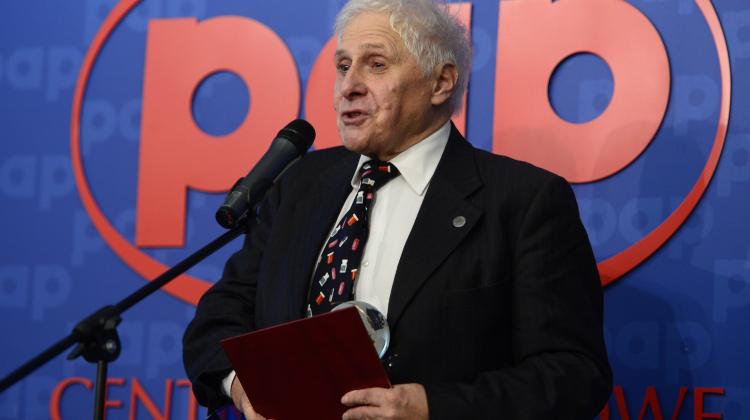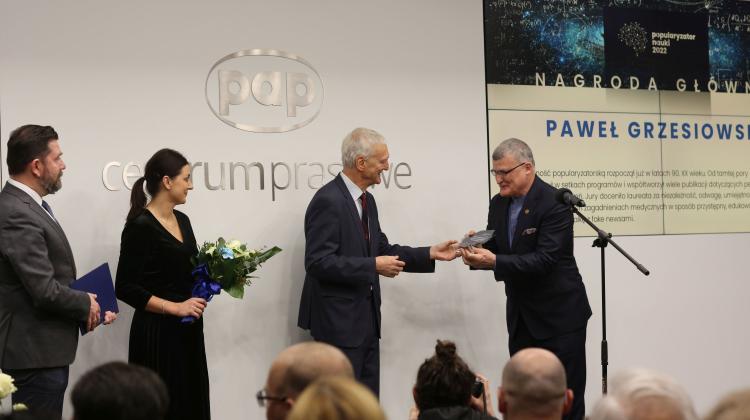The man of many talents: Prof. Jerzy Vetulani died on April 6, 2017

Prof. Jerzy Vetulani died died in Kraków at the age of 81, due to injuries sustained in a road traffic accident. He was an eminent psychopharmacologist, neuroscientist, biochemist, committed promoter of science, but also one of the founders of the Kraków\'s Piwnica that he later used to frequent.
This man of many talents was born on January 21, 1936 in Kraków, in a family of professors. His mother - Irena - was a biologist, and father Adam an associate professor since 1928, and since 1934 a professor of law at the Jagiellonian University.
As Jerzy Vetulani mentioned in his interview with Andrzej Kobos (published in 2007 in the book Po drogach uczonych), the Vetulani family has Italian-Tuscan roots, and arrived in Poland more than 250 years ago.
The future professor began his education earlier, during the occupation, in an underground classes. In 1952, he graduated with honours from the Bartłomiej Nowodworski Secondary School in Kraków. As a result, he began studying two years earlier than his peers - in 1952, at the age of 16, he was admitted to the Jagiellonian University.
"This saved time gave me the opportunity to get the second degree in chemistry without age pressure. I studied biology first" - he said years later in the aforementioned interview.
Jerzy Vetulani\'s adventure with Piwnica pod Baranami also began in the 1950s. "I think the idea of >>Piwnica<< was born when Joanna Olczak met with Piotr Skrzynecki. A large group of young people gathered in her apartment, in her room at the Literary Union at Krupnicza 22; I remember Flaszen, Nowak, Stefan Bratkowski, Wojtek Plewiński - many people who are well known today. I was one of the younger among them. (...) At first it was a sort of a club we would frequent, and the cabaret started" - Vetulani reminisced in a interview with Kobos.
In the absence of Skrzynecki, who had left for Paris for a while, he began to organise song revues. He stopped coming to Piwnica after the death of his younger brother Jan, who drowned in a kayaking accident on the Dunajec in 1965.
"Suddenly, I had to completely change my position of life. Until my brother\'s death I was a black sheep in the family. My family was decent, anti-Communist, Catholic. In 1948, at the age of 12, in spite of my parents I joined the Polish Youth League, I started a career there as an intelligent young man. (...) I had already stopped going to church. Then I joined the Club of Atheists and Free Thinkers. (...) I did not baptize my child "- he told Kobos years later.
Meanwhile, after the death of his brother, he had to - as he called it - "become a good son". "The first thing I did was baptizing Marek (his eldest son - ed.) so that my parents would think that at least Janek did something from beyond the grave. I gave up sailing and kayaking. I had two degrees: in biology and chemistry; I mobilized and started working on my doctorate" - he added.
He defended his dissertation at the Institute of Immunology and Experimental Therapy of the Polish Academy of Sciences in Wrocław. In 1967 he received a Riker scholarship and travelled to Cambridge, England. He later said that at Cambridge he learned many important research methods that he would later use.
Most of his career was associated with the Institute of Pharmacology of the Polish Academy of Sciences in Kraków. He received the title of professor at the Institute in 1989. After reaching the retirement age in 2007, he continued to work at the Department of Brain Biochemistry of the Institute of Pharmacology PAS and lectured at J. Dietl Małopolska Higher Vocational School in Krakow.
Vetulani become internationally famous for his research on the effects of antidepressants, conducted in the 1970s. Prof. Vetulani was the first to develop a hypothesis on the effects of psychotropic drugs by inducing adaptive changes. In part due to these studies, he became one of the most cited Polish scientists dealing with medicine and biology.
The professor carried out many research projects on psychopharmacology, the effects of drugs on the functioning of the mind. He studied, among other things, the effects of electroconvulsions and drug dependence - e.g. morphine. He also became interested in the functioning of memory and learning mechanisms. His academic achievements include more than 500 publications, including more than 230 original research papers.
In one of the interviews with PAP Vetulani declared that promotion of science was one of his life\'s passions. As he emphasized, the work of science promoter forced him to become acquainted with various fields of knowledge. "One is no longer a specialist in one area, one can see different aspects of research and its applicability" - he said.
In the 1960s, the researcher published popular science texts in the journal "Wszechświat". For 21 years (1981-2002) he was the editor-in-chief of this oldest Polish popular science journal.
In his articles and lectures, Vetulani did not avoid difficult and often controversial topics, and hundreds of his fans gathered at meetings with the professor. He shared with his audience not only the latest findings of neuroscientists, but also the socially important conclusions of these studies.
He gave hundreds of lectures and speeches at training conferences, scientific meetings, universities of the third age, universities of children, etc. His many books include: Dzień dzisiejszy i jutro neurobiologii (Today and Tomorrow of Neurobiology), Jak usprawnić pamięć (How to Improve Memory), and Piękno neurobiologii (The Beauty of Neurobiology). In 2011, the professor was awarded the Kraków Book of the Month Award for his publication Mózg: fascynacje, problemy, tajemnice (The Brain: Fascinations, Problems, Secrets).
Prof. Vetulani also had a popular scientific blog Piękno neurobiologii (The Beauty of Neurobiology), on which commented on current discoveries in the field of brain science.
He also promoted neuroscience... on stage. He performed with short neurobiological articles at the weekly event "Gadający Pies" ("Talking Dog"), which took place monthly at the Piękny Pies Club in Kraków from the second half of 2010 to March 2015 (with a few months break in 2012). Together with the Kraków singer and poet Leszek Długosz he prepared the concert "Rozumie mój - Pieśń i poezja z komentarzem neurobiologicznym" ("Oh, My Mind - Song and Poetry with a neurobiological commentary").
The scientist also became known as a supporter of medical marijuana. In 2016, he joined the Medical Marijuana Citizens Committee, which organized the collection of signatures under the draft law allowing the marketing of medical marijuana.
Vetulani\'s discoveries brought him numerous awards, including the International Anna-Monika Prize (2nd Prize) for Research into the biochemical foundations of the mechanisms of action of antidepressant therapeutic methods (1983), the Copernicus Award (1995) and the Konorski Award (2001). He was also a laureate of many awards of the Scientific Secretary of the Polish Academy of Sciences and the Faculty of Medical Sciences of the Polish Academy of Sciences. In 2012, he was awarded the title of Science Populariser in the competition organised by the Polish Press Agency and the Ministry of Science and Higher Education.
At the Institute of Pharmacology PAS Prof. Vetulani was the deputy chairman of the Scientific Council. He was also a member of the Presidium of the PAS Branch in Kraków, an active member of the Polish Academy of Arts and Sciences, vice president of the Polish Copernicus Society of Naturalists and the Institute of Pharmacology of the Polish Academy of Sciences. He became an honorary doctor of the Medical University of Silesia and Medical University of Lodz. He was a member of numerous national and international scientific societies.
PAP - Science and Scholarship in Poland
lt/ agt/ kap/
tr. RL
Przed dodaniem komentarza prosimy o zapoznanie z Regulaminem forum serwisu Nauka w Polsce.















